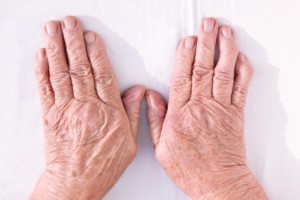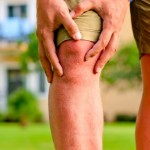

 There are over 100 different types of arthritis, ranging from mild to quite severe. Arthritis commonly effects the joints as a result of inflammation. Arthritis can affect anyone at any age and nearly three out of five people living with arthritis are under the age of 65, this according to the Arthritis Society of Canada.
There are over 100 different types of arthritis, ranging from mild to quite severe. Arthritis commonly effects the joints as a result of inflammation. Arthritis can affect anyone at any age and nearly three out of five people living with arthritis are under the age of 65, this according to the Arthritis Society of Canada.
One type of arthritis, in particular, is psoriatic arthritis. It is most commonly seen in individuals with psoriasis – a skin condition. In those cases, it is typical that the psoriasis comes first, followed by the psoriatic arthritis.
 Like many other forms of arthritis, psoriatic arthritis is caused when the body’s immune system attacks itself – meaning healthy cells are put under attack. This attack leads to inflammation in the joints and an overproduction of skin cells.
Like many other forms of arthritis, psoriatic arthritis is caused when the body’s immune system attacks itself – meaning healthy cells are put under attack. This attack leads to inflammation in the joints and an overproduction of skin cells.
Not much is known about why the body would begin to attack its own healthy cells but both environmental and genetic factors may be responsible. Research has uncovered some genetic markers which increase a person’s risk of developing psoriatic arthritis.
Additional risk factors include a family history, a diagnosis of psoriasis and age – psoriatic arthritis is commonly seen in those between 30 and 50.
 Arthritis is generally a chronic illness and psoriatic arthritis is no different. Although you may have periods where symptoms improve, symptoms of psoriatic arthritis will remain with you over time.
Arthritis is generally a chronic illness and psoriatic arthritis is no different. Although you may have periods where symptoms improve, symptoms of psoriatic arthritis will remain with you over time.
Symptoms of psoriatic arthritis include:
Generally, joints in the body will experience pain, but the severity of the pain can fluctuate on a daily basis.
 There is currently no cure for psoriatic arthritis but treatment options are available. Medical treatments involve the use of anti-inflammatory medications, disease-modifying anti-rheumatic drugs (which slow down progression), immunosuppressants (medications to tame the immune system), steroid injections (to reduce inflammation quickly) and joint replacement surgery.
There is currently no cure for psoriatic arthritis but treatment options are available. Medical treatments involve the use of anti-inflammatory medications, disease-modifying anti-rheumatic drugs (which slow down progression), immunosuppressants (medications to tame the immune system), steroid injections (to reduce inflammation quickly) and joint replacement surgery.
Home remedies for psoriatic arthritis include exercise, protecting your joints, maintaining a healthy weight – extra weight adds stress to already painful joints – and using cold and hot packs to reduce inflammation. Diet, too, can play a role in treating psoriatic arthritis.
Here is a list of foods you should add to your diet to better manage psoriatic arthritis. These foods have been shown to help reduce inflammation.
On the other hand, there are foods which you should limit or avoid, as they may aggravate psoriatic arthritis and promote inflammation. They are:
By knowing what to eat and what to avoid you can ease symptoms associated with psoriatic arthritis and reduce inflammation flare-ups.
Should you exercise if you have arthritis?
If we have an underlying health condition, like arthritis, exercise may be difficult and almost scary. No matter the benefits, if we think exercising will increase our pain, it’s likely we’ll avoid it. Here’s what you need to know about staying active with arthritis. Continue reading…
Facts about osteoarthritis
Osteoporosis is a condition that affects the bones. Bones become brittle and more likely to fracture. Osteoarthritis, on the other hand, is a painful form of arthritis that affects the joints in the body. Continue reading…
Psoriasis and eczema skin disease: Differences, causes, symptoms and treatment
If you have ever experienced itchy, irritated skin, then you know how frustrating and uncomfortable it can be, so understanding the differences between skin diseases like psoriasis and eczema, and knowing how to go about treating the skin, can bring both physical and emotional comfort.Continue reading..
Copyright © www.orthopaedics.win Bone Health All Rights Reserved